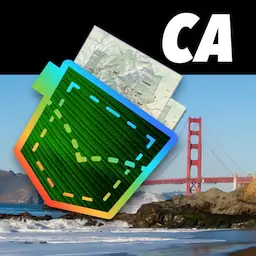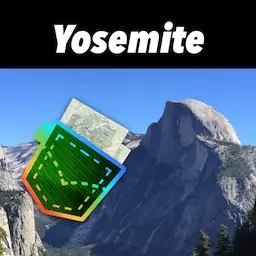"California State Mining and Mineral Museum." by California Department of Parks and Recreation , public domain
BrochureCalifornia State Mining and Mineral Museum |
Brochure of California State Mining and Mineral Museum in California. Published by California Department of Parks and Recreation.
featured in
| California Pocket Maps |  | |
| Yosemite Pocket Maps |  |
California State
Mining and Mineral
Museum
Our Mission
The mission of California State Parks is
to provide for the health, inspiration and
education of the people of California by helping
to preserve the state’s extraordinary biological
diversity, protecting its most valued natural and
cultural resources, and creating opportunities
for high-quality outdoor recreation.
The specimens in today’s
collection include a
gracefully curved sheet
of natural copper,
a platinum nugget, gold,
precious gems, rocks,
and mineral crystals from
California State Parks supports equal access.
Prior to arrival, visitors with disabilities who
need assistance should contact the park at
(209) 742-7625. If you need this publication in an
alternate format, contact interp@parks.ca.gov.
CALIFORNIA STATE PARKS
P.O. Box 942896
Sacramento, CA 94296-0001
For information call: (800) 777-0369
(916) 653-6995, outside the U.S.
711, TTY relay service
www.parks.ca.gov
California State
Mining and Mineral Museum
5005 Fairgrounds Rd., Mariposa, CA 95338
(209) 742-7625
© 2010 California State Parks (Rev. 2017)
every continent on Earth.
T
he California State Mining and Mineral
Museum, situated along Highway 49 in
the historic gold-rush town of Mariposa,
houses, displays, and interprets the official
California State Mineral Collection.
The museum, located at the Mariposa
County fairgrounds, is dedicated to teaching
the visiting public about the importance of
mining and minerals to California’s history,
environment, economy, and future.
The collection began in 1880; since then,
visitors and researchers have been dazzled
by the many exceptional specimens of
California’s gemstones and minerals — such
as gold, silver, copper, and platinum — in
the museum. The remarkable items on
display include original mining artifacts and
historical documents, precious mineral and
gem specimens from all over the world,
minerals that glow in the dark, and even
several “outer space” rocks (meteorites).
News of the 1848 gold discovery brought
about 100,000 would-be millionaires from all
over the world. Thinking that gold lay around
underfoot, some had planned to fill their
pockets and return home wealthy. Many gave
up after realizing that not even a lot of hard
work could make them rich overnight.
California State Mining Bureau
In 1880 State legislators established the
California State Mining Bureau. A vital service
offered by the new agency was classifying
and identifying minerals found anywhere in
California. Before long, the new bureau was
inundated with specimens submitted for
identification from all over the world.
Henry G. Hanks, the first California
State Mineralogist, was hired to examine
and classify specimens submitted to the
Mining Bureau. Hanks was directed to make
his findings available for scientific and
educational purposes.
CALIFORNIA MINING HISTORY
Only small mining operations
preceded California’s 1848
gold discovery in Coloma.
Gems (precious or semiprecious stones) such
as turquoise, garnets,
and even diamonds had
been found in Amador,
Butte, El Dorado, Nevada,
and Trinity counties.
Silver, copper, mercury,
and other minerals had
previously been mined
Mining for minerals
in California.
A Home for the Collection
The State’s initial collection —
1,327 specimens donated by
the California State Geological
Society — was first displayed
in the State Mining Bureau’s
San Francisco offices. Ore
specimens and donations were
constantly added. Between
1880 and 1983, the collection
moved five times. The Ferry
Building on the Embarcadero
housed the collection until
1983 when building renovations
forced yet another move.
Junior Rangers earn their badges.
The Mariposa County Board of Supervisors
requested that the specimens be moved
to the town of Mariposa; in July 1983, the
entire collection was packed and moved to
a temporary location in the old Mariposa
County Jail. The more valuable specimens
were stored in a bank vault in Mariposa.
The collection was finally moved to its new
home at the Mariposa County Fairgrounds
in 1986, and the former Mining Council
Building became the main exhibit area. The
museum was transferred to California State
Parks in 1999. At present, California State
Mining and Mineral Museum is the only
state park without any associated land.
The Collection Today
The museum collection has grown tenfold
since its beginning and holds over 13,000
specimens, with about 350 rotating on display
at any one time. Original historical documents
include a map of John C. Frémont’s Mexican
The Fricot Nugget
The legendary Fricot (free-co) Nugget —
weighing 13.8 pounds — is the largest
remaining intact mass of crystalline gold
dating back to the California gold rush. The
specimen of gold crystallized when hot goldbearing quartz veinlets cooled in softer slate
and schist rock.
This rare specimen was discovered in a
mud pocket deep in the Grit Mine, near the
American River’s middle fork, by William
Russell Davis in August of 1864. In 1865,
Grass Valley resident Jules Fricot purchased
it from Davis and displayed it at the 1878
Paris Exposition. The nugget then spent
more than 65 years stored in Fricot’s safe
deposit box. In 1930, Fricot’s daughter
donated the unique specimen to the
Museum’s collection.
land grant, as well as early California State
Mining Bureau reports. Minerals and
gemstones on display range from exhibit
quality to research samples. Specimens on
loan from other collections are also shown
throughout the building.
Benitoite, the Official State Gemstone
In 1906, benitoite (ben-ee-toe-ite) — an
extremely rare stone whose crystals are
typically blue — was discovered at the
Benitoite Gem Mine in San Benito County.
The mine, which is now closed, was the
world’s only source of gem-quality stones.
When displayed under short-wave ultraviolet
light, the stone glows vivid, fluorescent blue.
EDUCATIONAL ACTIVITIES
Free children’s activities include the Junior
Ranger program. School and group tours
focusing on geology, rocks, minerals, and
gold rush and mining history are available
by reservation.
SPECIAL EVENTS
• The annual gem and mineral show in April
has exhibits, speakers, children’s activities,
and vendors.
• During the Mariposa County Fair on Labor
Day weekend, the museum presents free
mineral-related activities and crafts for
children.
• The museum shop sells jewelry, mineral
art and specimens, and books on rocks,
minerals, mining, gold prospecting, and
California history.
Proceeds
support the
park’s nonprofit
association,
which funds
educational and
Benitoite: California
interpretive
State gemstone
programs.
Photo courtesy of Jeffrey Scovil
Adjoining the building, a re-created “old
mining tunnel,” complete with support
timbers and “workers,” interprets the
experience of hard-rock miners. In the mining
gallery, displays include a full-size windlass
(a hand-cranked device that lowered a
bucket on a rope to remove mining debris),
an ore cart, and a working scale model of a
stamp mill, which pounds and crushes ore to
extract minerals within it.
ACCESSIBLE FEATURES
The museum exhibits and the gift shop are
accessible. Help is available to reach items
on top shelves. Designated accessible
parking is available, or passengers may be
dropped off at the entrance. Some persons
may need assistance on the entry ramp.
PLEASE REMEMBER
For current information, call the park
in advance at (209) 742-7625 or visit
www.parks.ca.gov.
NEARBY STATE PARKS
• Wassama Round House State Historic Park
Road 628, Ahwanee 93601
(209) 742-7625 Information
• Columbia State Historic Park
11255 Jackson St., Columbia 95310
(209) 532-3184
• Railtown 1897 State Historic Park
Highway 108 at 5th Avenue
Jamestown 95327 (209) 984-3953
This park receives support in part from a nonprofit organization. For more information, contact
California State Mining and Mineral Museum Association P.O. Box 687, Mariposa, CA 95338
http://camineralmuseum.org
Stibnite
Photos courtesy of Jeffrey Scovil
Fluorite
Gold
Topaz
Aragonite
Elbaite
CA State Mining and
Mineral Museum
MARIPOSA COUNTY
Gate
Assay
Office
Non-Park Building
Placer
Exit
Tunnel
© 2010 California State Parks (Rev. 2017)
Sonora
Railtown 1897
mn e
SHP
uolu
120
Turlock
Modesto Lake
SRA
49
Turlock
Lake
99 McConnell d
SRA Merce
George J.
Hatfield
SRA
140
R i v er
S
n
ui
152
er
Riv
5
to Los
Angeles
National
El Portal
Park
Mineral Use
Exit
SHOP
CA STATE
MINING AND
MINERAL
MUSEUM
Sierra
NF
to
Fresno
99
41
Millerton
Lake
Millerton
Lake SRA
0
15
5
30
60 Feet
45
10
15
see
outset
map
CA STATE
MINING
AND
MINERAL
MUSEUM
Wassama
Round
House
SHP
0
Madera
to
Mariposa
Main Museum
Entrance
41
49
Mineralogy
GIFT
Mining
Lake
McClure
140
99
Great
Valley
Merced
Grasslands a n Joa
q
SP
to Stockton
GALLERY
Exit
R i v er
120
Mariposa
GALLERY
Minerals
Yosemite
140
132
CENTRAL
20 Meters
0
150
300 Ft
0
50
100 M
MARIPOSA
COUNTY
FAIRGROUNDS
P
49
to
Oakhurst
nce
30 Km
Jamestown
Exit
tr a
20
Hetch
Hetchy
Reservoir
MINERAL
En
10
Sierra
NF
MINING
Fluorescents
M
ai
n
0
Columbia SHP
20 Mi
10
T
0
Windlass
Garnets
GALLERY
Gems
Restrooms
Stamp
Mill
L
Gold
Meteorites
California Minerals
Parking
P
NNE
CA STATE
MINING AND
MINERAL
MUSEUM
Gems
Park Building
E TU
Touch Table
Legend
FAIRGROUNDS
Metals
MIN


